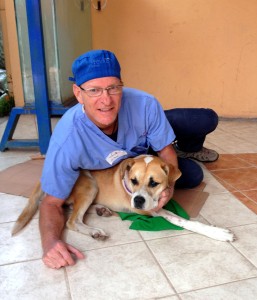
Dr. Joe Zulty in recovery with Puma after his leg amputation. World Vets Cusco, Peru project 2012.
It begins in the stone streets of Cusco, an ancient city of 600 thousand people, constructed by the Incas in the magnificent Andes mountains at 3,400 meters above sea level. There are many dogs in the streets, in doorways, everywhere. Unlike those of the U.S., these dogs are very talented. They know how to negotiate the streets, to stop at corners, and incredible how to avoid traffic.
Well, maybe not all of them.
On day two of World Vets spay/neuter clinic, three members of the Peruvian National Police, dressed in green uniforms, appearing strict and emotionless, delivered two dogs that had been running the streets. Both were discovered with 2 other dogs, all four belonging to a woman who loved them but unfortunately was not capable of providing for them. The older of the
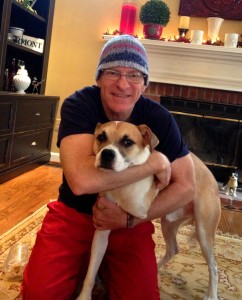
Dr. Joe Zulty with Puma following World Vets project in Maryland, USA.
two was scruffy but OK, the younger one however needed our help. He had a paw that was completely paralyzed and severely swollen. Its appearance was that of the paw of the Puma in the ancient wall of the Saqsayhuaman ruins. And there was something else worth mentioning. Perhaps another sign from the Incas, I am not sure. It is that moment in time that captures your heart and gives a true relevance to why we do what we do.
One of the police officers, a woman who was especially very quiet and very reserved, spoke not with words but with the hardly noticeable tears in her eyes. Those wet eyes touched me, made their way to my heart, and reinforced what the Incas were trying to tell me.
So the next day, on the last day of clinic, with the help of local Peruvian veterinarian, Dr. Carmen Caceres, the paw that touched but did not feel the surface of the street, was removed. Incredibly this dog, just 2 hours after surgery, was awake, standing, and wagging his tail! That was when one of World Vets volunteers stated, “It is not too difficult to take a dog back to the U.S. We brought a dog back from Ecuador on a past World Vets project.”
With the assistance of Monica Chacon of Pataz Pro Animalista Cusco, officer Glenda Anchea Garavito, Dr. Edgar Ochoa and his colleagues at Lazzie Vet Clinic, and the spiritual support of the Incas, the process of transporting a dog from one hemisphere to another became a reality. The forces were too strong. It was meant to be I suppose. In the airport in Cusco, my son Zack and I , with our new pet Puma, said goodbye to our friends from Cusco and of course the conversation was full of tears. But special moments like this do not come often. I was proud to be a veterinarian. I was proud of having worked with people who make a difference in the life of an animal. And I am pretty sure the ancient Incas were smiling from above.
**This article was written by Dr. Joe Zulty, a World Vets field service veterinarian. This article reflects his participation on World Vets Cusco, Peru project in 2012 when Puma was assisted and then adopted. Dr. Zulty is leading a World Vets small animal project to Sosua, Dominican Republic in November 2013. Read more about this volunteer opportunity here.
World Vets has an upcoming volunteer opportunity to Cusco, Peru operating September 28 – October 5, 2013. Volunteer positions remain open for the tech/student category. This position can be filled by licensed vet techs, non-licensed vet techs, vet students, pre-vet students and vet tech students. Read more about this volunteer opportunity here
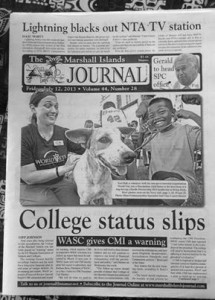 MAJURO, Marshall Islands (July 4, 2013) Tori Hall, a volunteer with the non-governmental organization World Vets, lets a Marshallese child listen to the heartbeat of a dog during a Pacific Partnership 2013 health fair.
MAJURO, Marshall Islands (July 4, 2013) Tori Hall, a volunteer with the non-governmental organization World Vets, lets a Marshallese child listen to the heartbeat of a dog during a Pacific Partnership 2013 health fair.



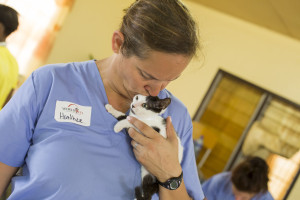 World Vets recently operated a pilot project* in Paramaribo, Suriname. We sent a volunteer veterinary team that provided a very successful large scale sterilization campaign which resulted in 250 surgeries being performed. Our team worked with Henk Abrahams Foundation, a local animal welfare organization. We thank Fondation Brigitte Bardot for their support of this visit as well as all the volunteers for their efforts. See pictures of our Suriname campaign
World Vets recently operated a pilot project* in Paramaribo, Suriname. We sent a volunteer veterinary team that provided a very successful large scale sterilization campaign which resulted in 250 surgeries being performed. Our team worked with Henk Abrahams Foundation, a local animal welfare organization. We thank Fondation Brigitte Bardot for their support of this visit as well as all the volunteers for their efforts. See pictures of our Suriname campaign 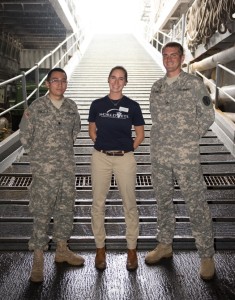 MALAPO, Tonga — Three Pacific Partnership members acted as first responders to a hit and run automobile accident on a local pedestrian during the Tongan portion of the 2013 mission.
MALAPO, Tonga — Three Pacific Partnership members acted as first responders to a hit and run automobile accident on a local pedestrian during the Tongan portion of the 2013 mission.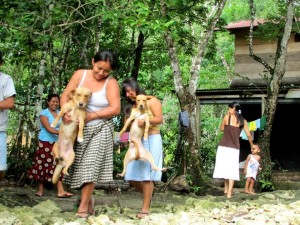 A World Vets team has just returned after a great adventure to the Atlantic Coast of Guatemala. Following 7 hours of travel, in a van and boat ride from the capital, they arrived in the Livingston/Rio Dulce region. During their visit they provided free veterinary services, a luxury for local cats and dogs, as local services for animals are hard to come by in such an isolated area. Many communities are only accessible by boat making veterinary care a great challenge.
A World Vets team has just returned after a great adventure to the Atlantic Coast of Guatemala. Following 7 hours of travel, in a van and boat ride from the capital, they arrived in the Livingston/Rio Dulce region. During their visit they provided free veterinary services, a luxury for local cats and dogs, as local services for animals are hard to come by in such an isolated area. Many communities are only accessible by boat making veterinary care a great challenge.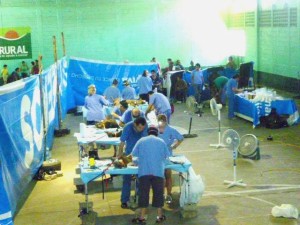 performed as well as an additional 200 plus health consultations and treatments provided to local animals. We also saw patients at the dock of our accommodations during the evening along the river. In these activities, we were joined by local volunteers and veterinary students from Universidad de San Carlos de Guatemala.
performed as well as an additional 200 plus health consultations and treatments provided to local animals. We also saw patients at the dock of our accommodations during the evening along the river. In these activities, we were joined by local volunteers and veterinary students from Universidad de San Carlos de Guatemala.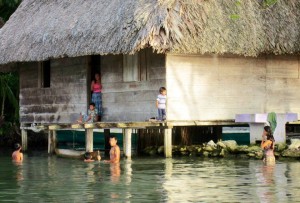 local Centro de Salud and municipality of Livingston for all their support in helping make this campaign possible. And finally we would like to thank local businesses and the community of Livingston for their warm welcome and hospitality.
local Centro de Salud and municipality of Livingston for all their support in helping make this campaign possible. And finally we would like to thank local businesses and the community of Livingston for their warm welcome and hospitality.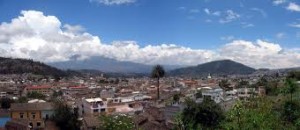 There is just 1 VETERINARIAN spot left open for our July 2013 Otavalo, Ecuador Project. Join us on a trip to the Ecuadorian Andes July 17 – 24, 2013 and provide a three day large scale sterilization campaign in the town of Otavalo!
There is just 1 VETERINARIAN spot left open for our July 2013 Otavalo, Ecuador Project. Join us on a trip to the Ecuadorian Andes July 17 – 24, 2013 and provide a three day large scale sterilization campaign in the town of Otavalo!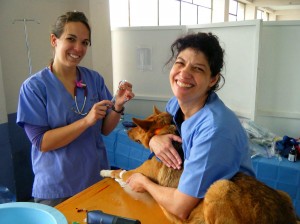 Ecuador since 2009. We have also secured an agreement with the municipality of Otavalo stipulating that they will not carry out poisoning campaigns in exchange for our free spay/neuter services for community animals.
Ecuador since 2009. We have also secured an agreement with the municipality of Otavalo stipulating that they will not carry out poisoning campaigns in exchange for our free spay/neuter services for community animals.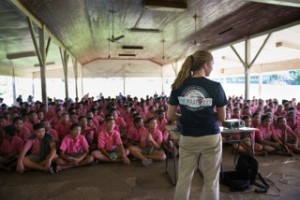
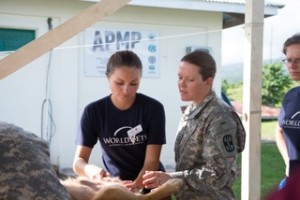
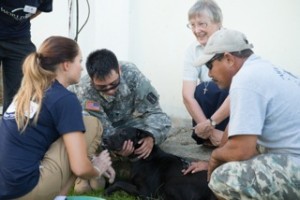
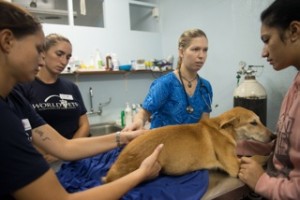
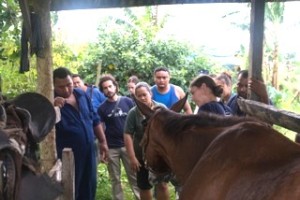
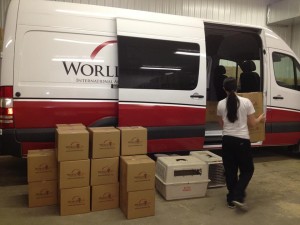 In response to the tornado that hit Oklahoma this month, World Vets teamed up with the
In response to the tornado that hit Oklahoma this month, World Vets teamed up with the 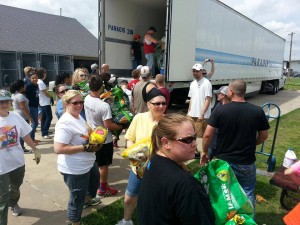 supplies that were delivered as part of a shipment organized by local Fargo, North Dakota TV station Valley News Live. These donated supplies were set up next to the “Reunion Facility” for owners that had been recently reunited with their pets to “shop” for food, crates, toys and more.
supplies that were delivered as part of a shipment organized by local Fargo, North Dakota TV station Valley News Live. These donated supplies were set up next to the “Reunion Facility” for owners that had been recently reunited with their pets to “shop” for food, crates, toys and more.

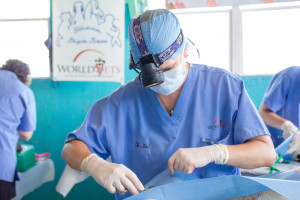 Volunteer veterinarians are still needed for two small animal projects that are scheduled to take place this summer in
Volunteer veterinarians are still needed for two small animal projects that are scheduled to take place this summer in 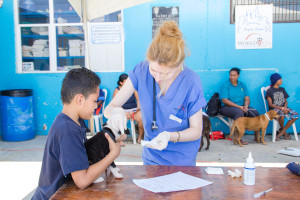 providing sterilization surgeries for cats and dogs, medical diagnosis and treatment, health consultations, and may be involved in performing other surgeries, teaching and/or instruction to students and/or local volunteers or pet owners.
providing sterilization surgeries for cats and dogs, medical diagnosis and treatment, health consultations, and may be involved in performing other surgeries, teaching and/or instruction to students and/or local volunteers or pet owners.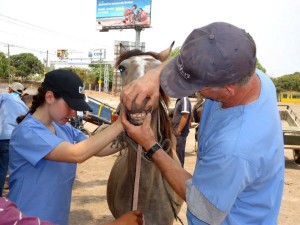 World Vets recently deployed a volunteer veterinary team to Granada, Nicaragua as part of our equine welfare project in the area. Our team, along with Nicaraguan veterinarians and students, held a free equine welfare clinic in and around the city which benefited 300 horses.
World Vets recently deployed a volunteer veterinary team to Granada, Nicaragua as part of our equine welfare project in the area. Our team, along with Nicaraguan veterinarians and students, held a free equine welfare clinic in and around the city which benefited 300 horses.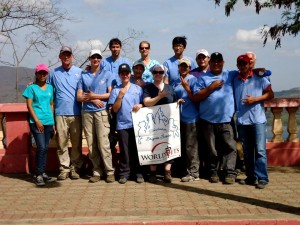 removals and more!
removals and more!